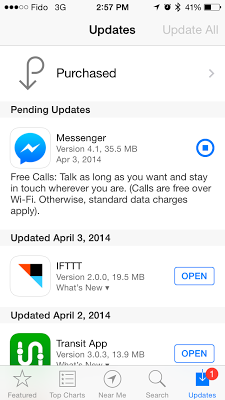All Facebook did in this update was make the “call” button a little bit more prominent in conversations, something that will hopefully prompt a little more use of the feature.
Sit back, relax, and unwind.


All Facebook did in this update was make the “call” button a little bit more prominent in conversations, something that will hopefully prompt a little more use of the feature.
In a conversation comparing mobile platforms, there is more to consider than just the look and feel of a phone or tablet. You have to take other factors into consideration, like apps, services, warranties, and the underlying framework that either Apple or Google uses to support their respective operating systems, iOS and Android.
My cousin and contributor on this blog, +Mike Attrell, and I have been comparing and contrasting the pros and cons of choosing either iOS or Android as your phone platform (as much as Microsoft and Windows Phone are making great strides with Windows Phone 8.1, they aren’t a part of this conversation yet).
We have each chosen 5 traits that make our favourite phone platforms stand out:
iOS
If you’re trying to make a decision about a new smartphone now, check out our video summarizing the differences between iOS and Android:
I’m very concerned and a little confused about all the talk about standing desks and their positive impacts on our health. In the article above they even call it “the new smoking”.
I can definitely see that in terms of being a little more active during the day, it can be beneficial to spend some time on your feet working out your legs so the muscles don’t go into disuse. However, it doesn’t seem like standing for 8 hours a day in one spot is really that much better for humans in general than sitting has been since modern humans started to make a living sitting or standing at a desk for the better part of a day.
Unless I am misunderstanding something important about human physiology, I don’t really see standing for 8 hours as being that much worse for you than sitting for those same 8 hours. Now, that’s not to say that I’m trying to compare a job where you’re walking around and moving for most of those 8 hours. I am just trying to reason out how we are blaming SITTING itself for these supposed problems, when really it seems that the effects that would be deleterious to your health would stem from being in one place and not moving for those 8 hours. Our species evolved to be able to stand for 8 hours a long time ago, so standing still really isn’t burning all that many more calories than our baseline sitting output.
I would love to be shown research that shows standing is MUCH better than sitting, or if the improvement in health comes from being in one place for a long period of time without moving around too much.
If the problem IS sitting itself and that specific bent-double posture, might I recommend reclining desks, where you can lie flat and work, although special desks for that movement are probably going to be even more expensive!